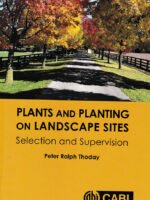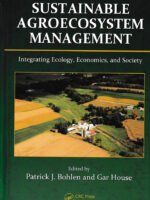Representing a complement, but not an alternative, to natural forests, planted forests have become increasingly important for reducing worldwide deforestation, loss of forest ecosystems and forest degradation. Examining the significance of this rapidly emerging world resource, chapters consider the strengths and weaknesses of planted forests, management objectives for their use and aspects of ownership and policy. Data from key production countries are used to evaluate the implications and sustainability of planted forests as a source of forest products as well as social and ecological issues.
Planted forests: uses, impacts and sustainability
Planted forests, although only seven per cent of the world’s forest resources, have superseded naturally regenerating forests as the principal source of industrial wood products. Lessening the pressure for wood production, tree planting has released natural forests to be managed for other purposes – carbon sinks, soil and water protection, conservation of biological diversity, recreation and amenity
Delivery
₹75 shipping all over India
Secure Payment
100% Secure Payment
₹3,955.00₹11,299.00
In stock
| SKU: | 9781845935641 |
|---|---|
| Categories: | Agricultural Science, Agriculture and Farming |
| Tag: | Agriculture Books |
Related products
-
Salmon Aquaculture
₹6,317.00Salmon aquaculture is one of the most rapidly developing industries in temperate ocean waters throughout the world. Under the expert guidance of three world authorities, an international team of contributing authors examine the underlying elements which have contributed to the accelerated growth of this industry and the likely consequences upon and for the industry as a whole.
₹19,740.00 -
Conservation and management of tropical rainforests: an integrated approach to sustainability
₹5,015.00Tropical rainforests fascinate scientists and explorers. The richness and variety of forms and the diversity of species have been acknowledged for centuries. Measures to protect endangered species within this ecosystem were already thought necessary in the mid-nineteenth century. Since the 1920s commercial greed, political misdemeanor and the relentless increase in the human population have all posed increasing threats to the future of rainforests. Sustainability is now of paramount importance.
₹11,662.00 -
Plants and planting on landscape sites: selection and supervision
₹4,692.00Landscape architects, design professionals and contractors alike require a good working knowledge of how to achieve plant establishment under a variety of conditions and situations. Overlooking the physiological needs of plants can lead to potential problems that can have negative financial and design impacts. Plants and Planting on Landscape Sites is a practical book giving practitioners in landscape design the essential horticultural knowledge and concepts needed to understand the limits of the material they are working with and make informed decisions.
₹10,200.00 -
Sustainable Agroecosystem Management: Integrating Ecology, Economics, and Society
₹5,306.00Emphasizes Centrality of the Ecosystem PerspectiveSustainable management of agroecosystems in the 21st century faces unprecedented challenges. Protecting the environment while feeding a burgeoning population that could reach nine billion by mid-century, preserving the world’s biodiversity, and sustaining agriculture in an increasingly urban world i
₹16,080.00 -
The Dry Forests and Woodlands of Africa: Managing for Products and Services
₹4,743.00The book provides a comparative analysis of management experiences from the different geographic regions, emphasizing the need to balance the utilization of dry forests and woodland products between current and future human needs. Further, the book explores the techniques and strategies that can be deployed to improve the management of African dry forests and woodlands for the benefit of all, but more importantly, the communities that live off these vegetation formations. Thus, the book lays a foundation for improving the management of dry forests and woodlands for the wide range of products and services they provide.
₹13,950.00 -
Plants and planting on landscape sites: selection and supervision
₹1,610.00Landscape architects, design professionals and contractors alike require a good working knowledge of how to achieve plant establishment under a variety of conditions and situations. Overlooking the physiological needs of plants can lead to potential problems that can have negative financial and design impacts. Plants and Planting on Landscape Sites is a practical book giving practitioners in landscape design the essential horticultural knowledge and concepts needed to understand the limits of the material they are working with and make informed decisions.
₹3,499.00 -
Regulating the Liabilities of Agricultural Biotechnology
₹3,564.00This book examines how government, industry and society interact to reach a level of regulation that is deemed satisfactory for the newly-emerged transformative technology that is agricultural biotechnology. It considers issues of risk and trust surrounding genetically modified plants for the production of food and pharmaceuticals.
₹9,899.00 -
Wild Product Governance: Finding Policies that Work for Non-Timber Forest Products
₹2,464.00Products from the wild, also known as non-timber forest products (NTFPs), are used as medicines, foods, spices, and a multitude of other purposes. They contribute substantially to rural livelihoods, generate revenue for companies and governments, and have a range of impacts on biodiversity conservation. However, there is little information available for those seeking to develop effective policy frameworks and regulation.
₹5,599.00








Be the first to review “Planted forests: uses, impacts and sustainability”